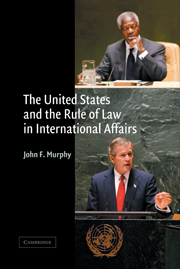Book contents
- Frontmatter
- Contents
- Acknowledgments
- Introduction
- 1 Law and legal process in international affairs
- 2 The status of international law under US law
- 3 UN dues
- 4 Use of force
- 5 Arms control, disarmament, nonproliferation, and safeguards
- 6 The law of the sea
- 7 The International Court of Justice
- 8 Prevention, prosecution, and punishment of international crimes
- 9 Human rights and international environmental issues
- 10 Summary and conclusions, and some possible future scenarios
- Index
10 - Summary and conclusions, and some possible future scenarios
Published online by Cambridge University Press: 22 September 2009
- Frontmatter
- Contents
- Acknowledgments
- Introduction
- 1 Law and legal process in international affairs
- 2 The status of international law under US law
- 3 UN dues
- 4 Use of force
- 5 Arms control, disarmament, nonproliferation, and safeguards
- 6 The law of the sea
- 7 The International Court of Justice
- 8 Prevention, prosecution, and punishment of international crimes
- 9 Human rights and international environmental issues
- 10 Summary and conclusions, and some possible future scenarios
- Index
Summary
The United States has had considerable difficulty in adhering to the rule of law in its conduct of foreign affairs. However, there also have been occasions when the United States has taken the lead in supporting the rule of law in resolving some of the major international issues. There has been, in other words, a substantial degree of inconsistency in the US record.
This chapter consists of two parts: a summary and conclusions, based on an examination of the preceding nine chapters; and some possible future scenarios relevant to the United States and the rule of law in international affairs.
Summary and conclusions
Deviations from the rule of law
US deviations from the rule of law, especially in recent years, have been numerous. These deviations have taken a variety of forms, and some of them have engendered considerable controversy. Some might cite the treaties that the United States has rejected in the face of overwhelming support from most other countries, including most particularly close US allies. These include, among others, the Statute of the International Criminal Court, the Landmines Treaty, the Comprehensive Nuclear Test Ban Treaty, the Kyoto Treaty, the Biological Diversity Treaty, the Law of the Sea Treaty, and the proposed Protocol to the Biological Weapons Convention. The United States also has been called to task for withdrawing from the ABM Treaty, although it did so in accordance with the terms of the treaty, and for refusing to explore means to eliminate or at least limit the global illicit trade in small arms and light weapons.
- Type
- Chapter
- Information
- The United States and the Rule of Law in International Affairs , pp. 349 - 360Publisher: Cambridge University PressPrint publication year: 2004



